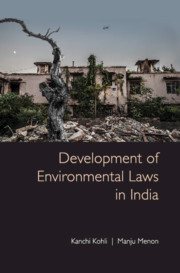Book contents
- Frontmatter
- Contents
- List of Tables
- Preface
- Acknowledgements
- Introduction: Environmental Laws and Development in India
- 1 Fundamentals of Environmental Law
- 2 Institutions Regulating India’s Environment
- 3 Forest Reservation and Conservation
- 4 Pollution Control and Prevention
- 5 Environmental Protection
- 6 Wildlife and Biodiversity Conservation
- 7 Ground and Surface Water Extraction
- 8 Land Acquisition
- 9 Climate Litigation and Policy Frameworks
- 10 Contemporary Environmental Law Reforms
- Index of Laws, Legal Cases and Government and Parliamentary Committee Reports
- General Index
5 - Environmental Protection
Published online by Cambridge University Press: 31 July 2021
- Frontmatter
- Contents
- List of Tables
- Preface
- Acknowledgements
- Introduction: Environmental Laws and Development in India
- 1 Fundamentals of Environmental Law
- 2 Institutions Regulating India’s Environment
- 3 Forest Reservation and Conservation
- 4 Pollution Control and Prevention
- 5 Environmental Protection
- 6 Wildlife and Biodiversity Conservation
- 7 Ground and Surface Water Extraction
- 8 Land Acquisition
- 9 Climate Litigation and Policy Frameworks
- 10 Contemporary Environmental Law Reforms
- Index of Laws, Legal Cases and Government and Parliamentary Committee Reports
- General Index
Summary
INTRODUCTION
The legal mandate for environmental protection is outlined through specific articles of the Constitution of India and the division of responsibilities between the centre and state governments as listed in its Seventh Schedule. Article 48A of the Constitution holds both the national and state governments accountable to ‘protect and improve the environment and to safeguard the forests and wildlife of the country’. The protection of the environment is also the fundamental duty of every citizen of the country as enshrined in Article 51A (g) of the constitution. Article 21 of the constitution, which is the right to life and personal liberty, has also been interpreted to include the right to clean and healthy environment through several court judgments. This is discussed in detail in Chapters 1 and 7.
The protection of the environment is the stated overarching objective of the central environment ministry. As discussed in Chapter 2, the environment ministry was carved out of the Department of Agriculture in 1984 primarily to realise the objective of environmental protection. The specific legal framework to achieve this objective is provided by the Environment Protection Act (EPA), 1986. Using the jurisdiction provided in this law, the environment ministry has introduced many regulations for its purpose. These regulations are the largest group of rules, notifications and guidelines that have dominated India's enviro-legal landscape. They have also led to the creation of an elaborate and multilayered institutional framework that is under the control of the central government.
The Indian parliament has exercised oversight in the enactment of rules and notifications only in specific instances where its intervention has been sought. But more generally, there has been little monitoring or oversight. Courts and tribunals have created a wide jurisprudence on a range of themes that are regulated by the EPA such as impact assessments, coastal areas regulation and environmental damages. The enactment of the National Green Tribunal (NGT) Act, 2010, institutionalised the role of this quasi-judicial body to respond to grievances and also influence environmental policymaking.
So far, there has only been one National Environment Policy (NEP), 2006, that laid down the contours of how environmental protection is to be prioritised in the country. The policy attempts to achieve environmental protection while continuing to advance economic ambition.
- Type
- Chapter
- Information
- Development of Environmental Laws in India , pp. 158 - 199Publisher: Cambridge University PressPrint publication year: 2021



